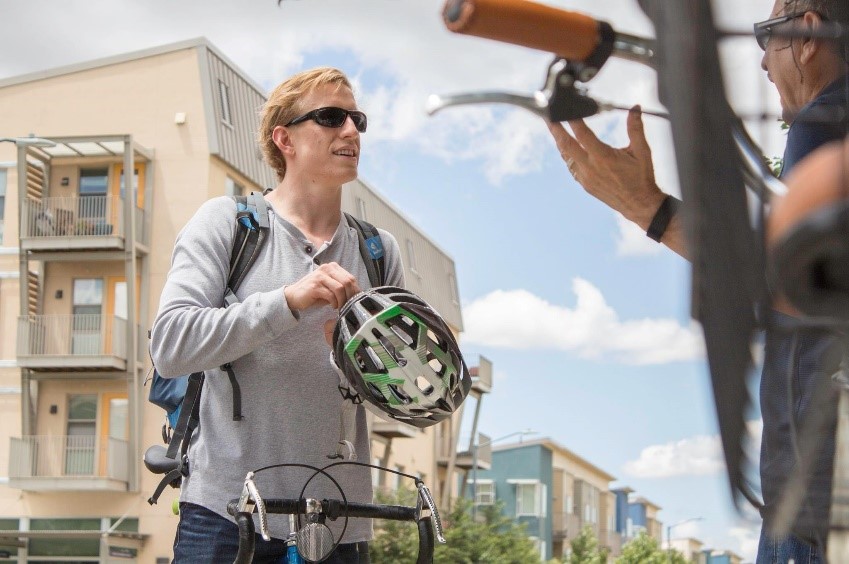News | METRANS Regional Student Profile: UC Davis’s Zane McDonald Finds Energy in Hydrogen and Cycling
Stop the VideoNews

PSR METRANS UTC
METRANS Regional Student Profile: UC Davis’s Zane McDonald Finds Energy in Hydrogen and Cycling
Sunday, June 18, 2017
by By Eric Tunell, USC Price School MPL 2018
[Editor’s note: As part of the expansion of METRANS into the Pacific Southwest Region 9 University Transportation Center, we seek to highlight students at universities that are new members of the UTC. This week we are pleased to feature UC Davis’s Zane McDonald.]
Cyclists have a hard time getting around safely in most areas of the United States, but those who live in rural parts of coal country and wish to get around on two wheels instead of in a 4x4 face extra challenges.
Such was the experience of Zane McDonald, who tired of the maintenance, gas costs, and difficulty of parking the Chevy Suburban that he began driving as a teenager. Before long, McDonald took up cycling as a more economical and eco-friendly way of getting around, and besides, he enjoyed the novelty of being “that bike-guy in a southern West Virginia town, way out in the hollars. Most people wouldn’t have been caught dead riding a bike to class!”
McDonald graduated from Marshall University in 2009 with a B.Sc. in Chemistry, relocating to California while working for FEMA out of McClellan Air Force Base, northeast of Sacramento. In his role at FEMA he worked closely with the California Conservation Corps, building trails for months at a time in remote backwoods locations. Spending time cut off from the outside world helped set McDonald on his current path.

Zane McDonald (Photo by Emmanuel Franco)
“This time communing with the wilderness was incredibly formative in shaping my enthusiasm for sustainability and conservation. I began thinking about ways to leverage my background in STEM to achieve a meaningful and rewarding career as an environmental steward,” he said.
At UC Davis, McDonald is pursuing an M.Sc. in Transportation Technology and Policy and an M.Sc in Energy Systems. He works at the university’s Sustainable Transportation Energy Pathways (STEPs) Research Consortium, and has contributed to research on active transportation and its role in reducing greenhouse gas emissions. Additional research has focused on energy generation and dispatch and flexible hydrogen production and storage.
McDonald is quick to acknowledge the support and guidance of the faculty at UC Davis:
This group of researchers offered me the multidisciplinary platform and relationship with private and public entities that I felt I needed to make an impact. Here I met with Dr. Lew Fulton. Lew offered me my first position as a graduate researcher working on global cycling research. Concurrently, I began chatting with Dr. Chris Yang and Dr. Joan Ogden about the various applications of H2. I was rapt by the subject, most fundamentally by the ability of H2 production to service so many looming issues— integration of renewable energy generation, zero emission transportation fuel, equity in energy access, and reduction in carbon intensity of grid electricity. H2 generation and storage became my academic passion.
Within the Pacific Southwest Region 9 UTC, McDonald is excited for new opportunities for collaboration between the member universities. He believes that the “diversity of the region itself” will help support inventive ideas to problem-solving, and that “employing the experiences and thought processes of a myriad of different people with different background is the key to inventiveness.”
After graduation, McDonald would like to work within industry and is considering pursuing an MBA during his next career. And although he expects to claim the west coast as his “home base” in the future, he hopes to live and work abroad while focusing his energies—both on hydrogen and behind handlebars.
About the Author
Eric Tunell is a second-year Master of Planning student in the Price School of Public Policy at the University of Southern California. He currently works for the METRANS Transportation Center, a joint partnership between USC and California State University Long Beach, and has worked previously in communications for the Bob Bondurant School of High Performance Driving and for National Geographic. He can be reached via email or on LinkedIn.
News Archive
- December (1)
- November (6)
- October (4)
- September (2)
- August (3)
- July (4)
- June (3)
- May (7)
- April (8)
- March (11)
- February (8)
- January (7)
- December (7)
- November (8)
- October (11)
- September (11)
- August (4)
- July (10)
- June (9)
- May (2)
- April (12)
- March (8)
- February (7)
- January (11)
- December (11)
- November (5)
- October (16)
- September (7)
- August (5)
- July (13)
- June (5)
- May (5)
- April (7)
- March (5)
- February (3)
- January (4)
- December (4)
- November (5)
- October (5)
- September (4)
- August (4)
- July (6)
- June (8)
- May (4)
- April (6)
- March (6)
- February (7)
- January (7)
- December (8)
- November (8)
- October (8)
- September (15)
- August (5)
- July (6)
- June (7)
- May (5)
- April (8)
- March (7)
- February (10)
- January (12)















